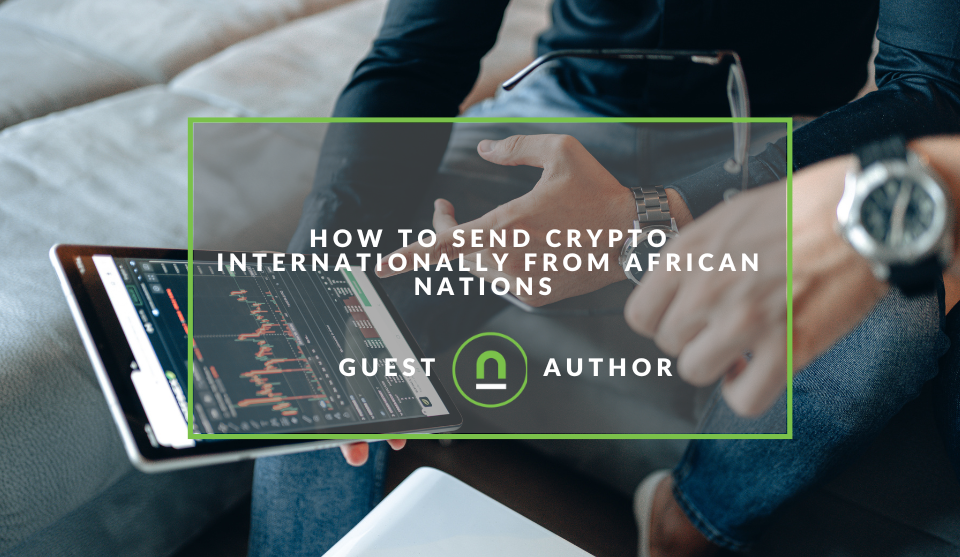Recent posts

Industry Experts
A Comprehensive Guide to Flyer Design: Digital & Physical Distribution
26 December 2024

Money Talks
Why Is There A Surge in Bitcoin Adoption in South Africa
24 December 2024

Money Talks
How To Safely Open Forex Trading Accounts in 2024
18 December 2024

Mind, Body & Soul
Understanding Cannabis in Modern Wellness
12 December 2024
Popular posts
Extravaganza
Trending Music Hashtags To Get Your Posts Noticed
24 August 2018
Geek Chic
How To Fix iPhone/iPad Only Charging In Certain Positions
05 July 2020
Extravaganza
Trending Wedding Hashtags To Get Your Posts Noticed
18 September 2018
Money Talks
How To Find Coupons & Vouchers Online In South Africa
28 March 2019
How To Send Crypto Internationally from African Nations
14 December 2023 | 0 comments | Posted by Pat in Money Talks
In an era where digital currencies redefine how we conduct financial transactions, manage our money and exchange value, Bitcoin and the broader cryptocurrency market have emerged as a groundbreaking tool for cross-border payments. Cryptocurrency has offered individuals a simpler and cheaper option by moving money across countries where exchange rates are constantly changing and where you're subject to dealing with different payment rails and costly fees.
Particularly in African countries, where traditional banking systems face numerous challenges, cryptocurrencies offer an efficient and cost-effective means to send money globally. If you are based in an African country, and you've found the forex market or local remittance apps too painful to use, and you're looking for solutions, Bitcoin and stablecoins might be an alternative you could explore.
To get you started, this guide delves into the essentials of using cryptocurrency for international money transfers from African nations, focusing on the streamlined process of sending crypto safely and effectively.
Why African adoption of cryptocurrency spreads like wildfire
Before diving into how to source cryptocurrency and use it, let's first look at the motivations to switch from your current options as an African.
1. Financial inclusion
Many African citizens lack access to traditional banking services. Bitcoin and stablecoins offer an alternative that is permissionless and accessible with just a smartphone and internet connection. This empowers individuals to manage their finances independently and participate in the global economy.
2. Inflation hedge
Several African countries have experienced high inflation in recent years. Bitcoin and stablecoins, especially those pegged to the US dollar, can offer protection against currency devaluation and preserve the value of savings.
3. Remittances
Sending and receiving money across borders can be expensive and slow in Africa. Bitcoin and stablecoins offer a faster and cheaper alternative for sending and receiving remittances, particularly between individuals without access to formal banking systems.
4. Technological innovation
Africa has a young and tech-savvy population that is open to adopting new technologies. Bitcoin and stablecoins are seen as innovative solutions to financial challenges, which have driven interest and adoption.
5. Limited regulation
While regulations are evolving, some African countries currently have limited regulations surrounding cryptocurrencies. This lack of regulatory burden has made it easier for individuals to adopt and use Bitcoin and stablecoins. It's important to note that adoption also varies across different African countries, with factors like economic stability, internet access, and government regulations playing a role.
Understanding cryptocurrency and its advantages
Cryptocurrency is a form of digital or virtual currency that uses cryptography for security and operates on a decentralised network, typically a blockchain. Unlike traditional currencies, it is not regulated by any central authority, making it inherently resistant to government interference and manipulation.
The advantages of using cryptocurrency for international money transfers are significant. Firstly, it often incurs lower transaction fees compared to conventional banking systems or money transfer services.
Secondly, transactions are processed swiftly, sometimes within minutes, contrasting with the days it can take for international bank transfers.
This speed is particularly beneficial for African countries, where banking processes can be slower. Additionally, cryptocurrency can be a boon for unbanked or underbanked populations, offering access to financial services without the need for a traditional bank account.
Setting up for crypto transactions
To send crypto, one must first set up a cryptocurrency wallet. This digital wallet is used to store, send, and receive cryptocurrencies. There are various types of wallets - online (web wallets), mobile, desktop, and hardware (physical devices). For beginners, online or mobile wallets offer a balance of convenience and security.
When choosing a wallet, consider factors like security features, user interface, and supported cryptocurrencies. Security is paramount; always opt for wallets with robust security measures such as two-factor authentication and regular software updates.
Purchasing cryptocurrency
Before you can send crypto, you need to own some. Cryptocurrency can be purchased on various exchanges using traditional currencies. African users need to find exchanges that support their local currency or widely accepted alternatives like USD or EUR. Platforms like Binance, Paxful, and LocalBitcoins are popular choices, offering different payment methods like bank transfers, mobile money, or even cash.
When purchasing crypto, it's crucial to be aware of the exchange rates and fees. Some exchanges charge higher fees but offer more convenience or better security, so weigh your options accordingly.
Sending crypto internationally
To send crypto, you'll need the recipient's wallet address. This is a unique string of characters that functions like a bank account number. Here's a step-by-step guide:
- Access Your Wallet: Log into your cryptocurrency wallet.
- Initiate a Transfer: Select the option to send crypto.
- Enter Recipient Details: Input the recipient's wallet address. Ensure this is accurate; transactions cannot be reversed.
- Enter Amount: Specify the amount of cryptocurrency to send. Be mindful of the exchange rates to ensure the recipient receives the correct amount in their local currency.
- Confirm and Send: Review the transaction details, including any fees, then confirm and send.
The transaction will be processed on the blockchain network, and funds should arrive in the recipient's wallet within minutes to hours, depending on the cryptocurrency and network congestion.
Legal and Regulatory Considerations
It's important to be aware of the legal and regulatory environment surrounding cryptocurrency in your country. Some African countries have restrictions or regulations concerning the use of cryptocurrencies. Always ensure compliance with local laws to avoid legal complications.
Sending crypto from African countries to other parts of the world offers an efficient, cost-effective alternative to traditional banking systems. With the right tools and knowledge, users can leverage the power of digital currencies to make seamless international transactions.
Limiting your exposure to risk and volatility
While cryptocurrency offers many benefits, it is still an emerging technology filled with complexity and risk, so novice users should be careful to hold only a little value in this payment option and conduct transactions within their ability to stomach a loss.
You also want to limit your exposure by only using these methods when you want to transact and instead hold your funds in a medium you feel comfortable with, whether with a bank, neo-banking service or in physical cash.
Tell us your story
Would you like to write for nichemarket just like Pat has? Find out how to submit a guest post, and when you're ready, you can contact us.
Contact us
If you would like to know more about digital assets or would like to market your digital asset company or how to set it up for your business, then don’t be shy. We’re happy to assist, simply contact us
Are you looking to promote your business?
Finance business owners can create their free business listings on the market. The more information you provide about your business, the easier it will be for your customers to find you online. Registering with nichemarket is easy; all you will need to do is head over to our sign-up form and follow the instructions.
If you require a more detailed guide on how to create your profile or your listing, then we highly recommend you check out the following articles.
Recommended reading
If you enjoyed this post and have a little extra time to dive deeper down the rabbit hole, why not check out the following posts on cryptocurrency and blockchain?
- Why Blockchain and Cryptocurrency Is The Future Of Money
- 24 Ways To Earn Cryptocurrency
- How To Pay Tax On Cryptocurrency In South Africa
- How To Buy Bitcoin In South Africa
- Why Does Your Bitcoin Wallet Address Keep Changing?
- How To Tokenise Your Art & Sell It For Cryptocurrency
Disclaimer: This article should not be taken as, and is not intended to provide any investment advice and is for educational purposes only. As of the time of posting the writers may or may not have holdings in some of the coins or tokens they cover. Please conduct your own thorough research before investing in any cryptocurrency, as all investments contain risk.
You might also like
How To Safely Open Forex Trading Accounts in 2024
18 December 2024
Posted by Sholanke Dele in Money Talks
Find a reliable forex broker so you can start trading in foreign exchange markets and ensure that you will still have access to your funds and avoid ...
Read moreUnderstanding Cannabis in Modern Wellness
12 December 2024
Posted by Alina Jones in Mind, Body & Soul
Cannabis is revolutionizing wellness, offering natural solutions for pain, stress, and holistic health through innovative, science-backed approaches ...
Read more{{comment.sUserName}}
{{comment.iDayLastEdit}} day ago
{{comment.iDayLastEdit}} days ago
 {{blogcategory.sCategoryName}}
{{blogcategory.sCategoryName}}
